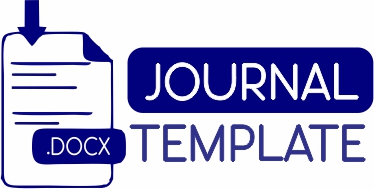Publication Ethics and Malpractice Statement
Publication Ethics and Malpractice Statement
Writer's Task
Reporting Standards:
Authors of the original research report must present an accurate account of the work done as well as an objective discussion of its significance. The underlying data must be represented accurately in the paper. A paper must contain sufficient detail and references to allow others to replicate the work. False or intentionally inaccurate statements constitute unethical behavior and are unacceptable.
Data Access and Retention:
Authors are required to provide raw data in connection with the paper for editorial review, and should be prepared to provide public access to such data (consistent with the ALPSP-STM Statement on Data and Databases), where practicable, and should under no circumstances be prepared to retain such data for a reasonable time after publication.
Originality and Plagiarism: The authors must ensure that they have written the entirely original work, and if the author has used the work and/or words of others that this has been properly cited or cited.
Multiple, Redundant, or Concurrent Publications:
An author may not generally publish manuscripts describing essentially the same research in more than one journal or major publication. Submitting the same manuscript to more than one journal at the same time constitutes unethical publishing behavior and is unacceptable.
Source Acknowledgment:
Proper acknowledgment of the work of others must always be given. Authors should cite publications that were influential in determining the nature of the reported work.
essay:
Authorship should be limited to those who have made a significant contribution to the conception, design, conduct, or interpretation of the reported research. All who have made significant contributions must be listed as co-authors. Where others have participated in certain substantive aspects of the research project, they must be recognized or listed as contributors. Appropriate authors must ensure that all appropriate co-authors and no inappropriate co-authors are included in the paper and that all co-authors have seen and approved the final version of the paper and have approved its submission for publication.
Disclosure and Conflict of Interest:
All authors must disclose in their manuscripts any financial or other substantive conflicts of interest that may be construed to influence the results or interpretation of their manuscript. All sources of financial support for the project must be disclosed.
Fundamental errors in published work:
When an author discovers significant errors or inaccuracies in his self-published work, the author must immediately notify the journal editor or publisher and cooperate with the editor to retract or correct the paper.
Human or Animal Hazards and Subjects:
If the work involves chemicals, procedures, or equipment that have unusual hazards inherent in their use, the author must identify these in the manuscript.
Editor's Task
Fair:
Editors evaluate manuscripts at all times for their intellectual content without regard to race, gender, sexual orientation, religious beliefs, ethnic origin, nationality, or political philosophy of the authors.
Confidentiality:
Editors and any editorial staff may not disclose any information about submitted manuscripts to anyone other than the appropriate authors, reviewers, potential reviewers, other editorial advisors, and publishers, as appropriate.
Disclosure and Conflict of Interest:
Unpublished material disclosed in submitted manuscripts may not be used in the editor's research without the written consent of the author.
Publication Decision:
The journal's editorial board is responsible for deciding which articles submitted to the journal should be published. The validation of the work in question and its importance to researchers and readers should always drive such decisions. Editors may be guided by the discretion of the journal's editorial board and limited by applicable legal requirements regarding defamation, copyright infringement, and plagiarism. Editors may consult other editors or reviewers in making this decision.
Review of Manuscripts:
Editors must ensure that each manuscript is initially evaluated by the editor for originality. Editors must regulate and use peer review fairly and wisely. Editors must describe their peer review process in information to authors and also indicate which sections of the journal they peer-reviewed. Editors should use appropriate peer reviewers for papers being considered for publication by selecting people with adequate expertise and avoiding them.




.png)

.png)
.png)
